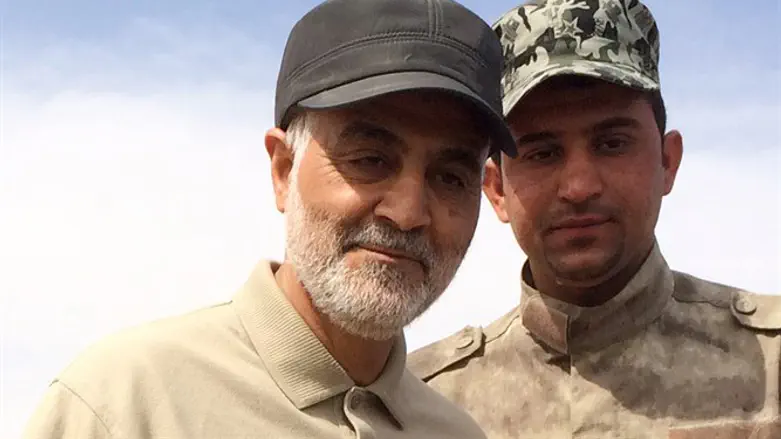
Yochanan Visser is an independent journalist/analyst who worked for many years as Middle East correspondent for Western Journalism.com in Arizona and was a frequent publicist for the main Dutch paper De Volkskrant. He authoreda book in the Dutch language about the cognitive war against Israel and now lives in Gush Etzion. He writes a twice weekly analysis of current issues for Arutz Sheva
At 12.15 AM local time, residents of the Israeli communities on the Golan Heights were forced to go into their safety rooms and public bomb shelters, already opened the day before when the IAF pre-empted another Iranian attempt to strike Israel.
However, the barrage of twenty Grad and Fajr missiles which were fired from Syria by the Quds Force of the Iranian Revolutionary Guards Corps led by General Qassem Soleimani triggered a devastating response by the Israeli military.
Using 28 IAF F-15 and F-16 fighter jets, the IAF destroyed more than 50 Iran-related targets in Syria, among them intelligence facilities, logistic headquarters, observation posts, weapon-storage facilities as well as rocket launchers and air defence batteries.
All together, the IAF and IDF used 60 air-to-ground missiles and 10 tactical ground-to-ground missiles, according to the Russian Defence Ministry.
The four-hour long Israeli offensive against the IRGC in Syria furthermore killed 28 Syrian soldiers and Shiite fighters, the Russians claimed.
On the Israeli side there were no reports of damages or casualties.
The Iron Dome anti-rocket shield intercepted 4 Fajr or Grad missiles over the Golan Heights, while a Patriot battery downed what seemed to be a modified Scud missile in the area of the northern Israeli city of Safed.
While some media outlets reported the Iranian attack could easily have triggered an all-out war, a closer look at the mini-battle on Wednesday night reveals that the parties operated according to a plan and did everything to avoid escalation towards a conventional war.
The Iranians limited their strikes to the Golan Heights, the most sparsely populated area in Israel, although they have the capability to strike Gush Dan and strategically important infrastructure throughout Israel.
The Iranians also didn’t order Hezbollah in Lebanon to use its 130,000 missiles against the Jewish state, in spite of the fact that IAF warplanes were breaching Lebanese airspace all the time during the offensive against the IRGC in Syria.
Hezbollah also didn’t react when debris of Israeli missiles struck several towns in the Bekaa valley nor did it respond when the IDF targeted one of its bases near Baath city in Syria.
Lebanese media apparently didn’t like Hezbollah’s passiveness in light of the massive Israeli offensive against the IRGC and published fake news reports claiming “Zionist military sites on the occupied Syrian Golan were targeted by dozens of missiles.”
Israel, meanwhile, deconflicted the situation by coordinating its actions with the Russians and by waiting to attack the IRGC-related targets until it had eliminated much of Syria’s air defenses.
The Israeli army later that revealed that Qassem Soleimani, the shrewd commander of the IRGC’s Quds Force and the man who won virtually every battle in Iraq and Syria over the last four years, had fallen into a trap.
IDF Spokesperson Brig. Gen. Ronen Manlis explained the Israeli army plundered the Iranian capabilities in Syria over the past month.
“They were dragged back because of the activity we carried out for over a month and during these past weeks,” Manlis said in reference to the string of IAF attacks on IRGC targets in Syria over the past five weeks.
“We laid out correct defensive preparations and we took a number of aggressive actions in recent weeks,” Manlis said while adding “Qassem Suleimani and the Quds Force paid a heavy price” Wednesday night.
Manlis then said the Israeli army had been ”preparing for this night, and the plan for what was going to be done was carried out as we wanted it to be,” adding that “the Quds Force chose to act against Israel in the wrong arena.”
The IDF spokesman repeated that Israel would not allow Iran to build itself up militarily in Syria.
Israel has dealt Iran blow after blow recently and not only in the Syrian arena
Last week’s stunning revelation that a team of Mossad spies stole roughly 11,000 files documenting Iran’s secret nuclear weapons program from a warehouse in Tehran last January humiliated the Islamist regime and might have played a significant role in the decision to attack Israel directly.
Iranian officials, meanwhile, are trying to hide the new humiliation at the hands of Israel and deny Iran paid a heavy price in Syria on Wednesday or is even involved in what’s going on in Syria.
Mohammad Javad Jamali Nobandegani, a prominent member of the security and foreign policy of the Majlis, the Iranian parliament, claimed Israel has a “long history of unprovoked attacks” in Syria and then said, despite all facts to the contrary, that Iran has no single base in the warn-torn country.